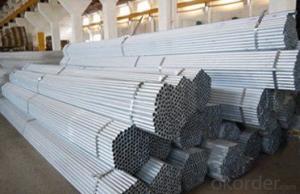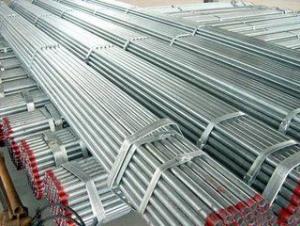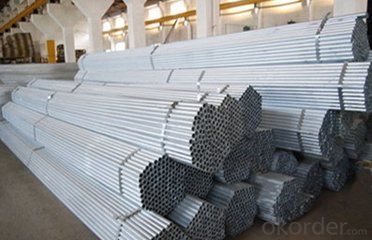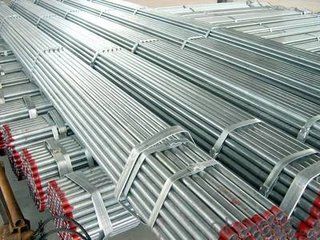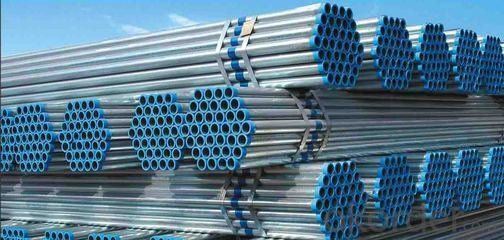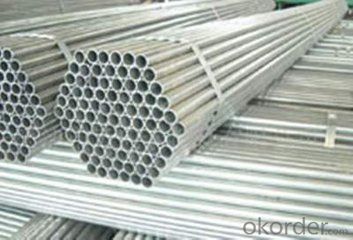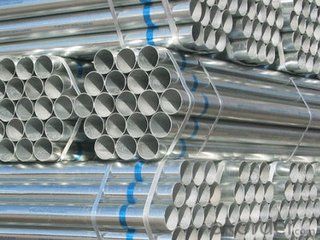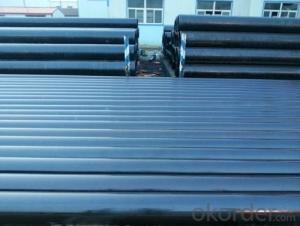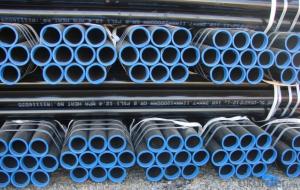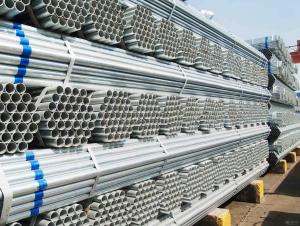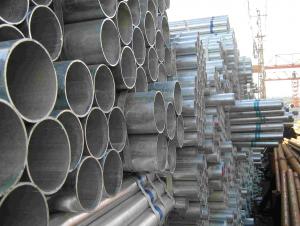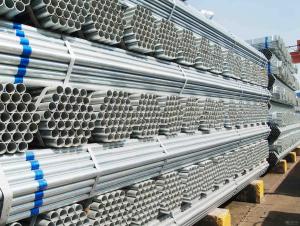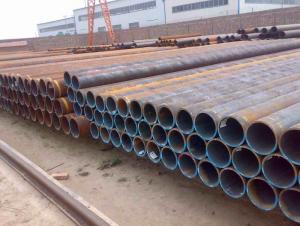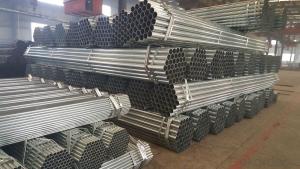1" ERW GALVANIZED PIPE A53 BS1387 Q235 THREAD END 200G
- Loading Port:
- Tianjin
- Payment Terms:
- TT OR LC
- Min Order Qty:
- 10 m.t.
- Supply Capability:
- 10000 m.t./month
OKorder Service Pledge
OKorder Financial Service
You Might Also Like
Specifications
HOT-DIP GALVANIZED PIPE FOR FLUID TRANSPORTATION
1.OD:33.4-114.3mm
2.WT:2.0-9.0mm
3.Zinc:200~600g/m2
Good serveice
We Offer You:
HOT-DIP GALVANIZED PIPE FOR FLUID TRANSPORTATION
HOT-DIP GALVANIZED PIPE FOR FLUID TRANSPORTATION | |||
1. Material | Steel Grade | Q195, Q235, Q345 etc. | |
Material Type | Available in cold rolled and hot rolled | ||
2. Size | W.T | 1.0mm-12mm | |
Diameter | 20mm~273mm | ||
Length | 5.8m-14m | ||
3. Zinc Coating | 200~600g/m2, could be thicker or thinner if you need | ||
4. Certification | BV, IAF, SGS,COC, ISO etc. | ||
5. Welding Technology | Longitudinal ERW | ||
6. Application | Urban construction, machine structure, agriculture equipment, water and gas pipes etc. | ||
7. Packing | Packing in bundle with steel strips; with seaworthy package at the end; could be done with your requirement. | ||
8. Delivery Time | Usually within 10-30 days after receipt of deposit, ASAP | ||
9. Trade Terms | FOB, CFR, CIF etc. | ||
10. Payment Terms | T/T, L/C etc. | ||
11. Loading Port | Xingang , Tianjin | ||
12. Original Place | Tianjin, China | ||
13. Company Information | Name | Reliance Metal Resource Co., Ltd | |
Type | Manufacture and trading company | ||
Supply Ability | 360,000 tons per year | ||
Galvanized Round Steel Pipe's Materials
| Elements Material | Chemical Compsition% | Mechanical Property | ||||||
| C% | Mn% | S% | P% | Si% | Yield Point (Mpa) | Tensile Strength(Mpa) | Elongation (%) | |
| Q195 | 0.06-0.12 | 0.25-0.50 | <0.050 | <0.045 | <0.030 | >195 | 315-430 | 32-33 |
| Q215 | 0.09-0.15 | 0.25-0.55 | <0.05 | <0.045 | <0.030 | >215 | 335-450 | 26-31 |
| Q235 | 0.12-0.20 | 0.30-0.70 | <0.045 | <0.045 | <0.030 | >235 | 375-500 | 24-26 |
| Q345 | <0.20 | 1.0-1.6 | <0.040 | <0.040 | <0.55 | >345 | 470-630 | 21-22 |
- Q: Can steel pipes be used for underground cable conduits?
- Yes, steel pipes can be used for underground cable conduits. Steel pipes have high strength and durability, making them suitable for protecting and housing cables underground. They provide excellent protection against external elements and can withstand a wide range of environmental conditions. Additionally, steel pipes offer good resistance to corrosion, ensuring the longevity of the cable conduit system.
- Q: Can steel pipes be used for telecommunications cables?
- No, steel pipes cannot be used for telecommunications cables. Telecommunications cables are typically made of fiber optic or copper materials. Steel pipes are used for various applications in construction and plumbing, but they are not suitable for transmitting data or electrical signals. Fiber optic cables are designed to carry high-speed data over long distances, while copper cables are used for transmitting both data and electrical signals. These cables have specific insulation and shielding properties that steel pipes do not possess, making them unsuitable for telecommunications purposes.
- Q: How are steel pipes used in the power generation industry?
- Steel pipes are extensively used in the power generation industry for various purposes, such as transporting steam, water, and other fluids in power plants. They provide a reliable and durable solution for the high-pressure and high-temperature conditions found in power generation systems. Steel pipes are also used for the construction of boilers, condensers, and heat exchangers, ensuring efficient heat transfer and energy production. Additionally, steel pipes are employed in the exhaust system of power plants to safely and efficiently discharge emissions. Overall, steel pipes play a critical role in the power generation industry by facilitating the transportation of fluids and contributing to the reliable and efficient operation of power plants.
- Q: Are steel pipes suitable for use in coastal areas?
- Yes, steel pipes are suitable for use in coastal areas. Steel is highly durable and resistant to corrosion, making it an ideal choice for withstanding the harsh conditions typically found in coastal environments, such as saltwater, high humidity, and strong winds. Additionally, steel pipes offer excellent strength and stability, ensuring their longevity and reliability in coastal applications.
- Q: What are the different types of steel pipe joints for underwater applications?
- There are various types of steel pipe joints used for underwater applications, including welded joints, flanged joints, and mechanical joints. Welded joints involve fusing the ends of the pipes together using welding techniques, creating a continuous, strong connection. Flanged joints use flanges, which are flat, circular discs, to connect and secure the pipes together. These joints are commonly used in applications that require frequent disassembly. Mechanical joints, on the other hand, utilize mechanical devices such as couplings or clamps to connect the pipes. These joints provide flexibility and ease of installation and removal.
- Q: How do you calculate the flow rate of water in steel pipes?
- To calculate the flow rate of water in steel pipes, you need to consider the pipe's diameter, length, and the pressure difference across the pipe. Using formulas like the Darcy-Weisbach equation or the Hazen-Williams equation, you can determine the flow rate by plugging in these variables along with the fluid properties.
- Q: How are steel pipes used in the renewable energy sector?
- Steel pipes are commonly used in the renewable energy sector for various purposes. They are used in the construction of wind turbine towers, providing support and stability to the turbines. Steel pipes are also used in the transportation of natural gas, which is considered a cleaner alternative to fossil fuels. Moreover, steel pipes are used in the construction of solar power plants, where they are utilized for the distribution of water and other fluids necessary for the cooling systems. Overall, steel pipes play a crucial role in the renewable energy sector, contributing to the development and efficiency of sustainable energy sources.
- Q: How are steel pipes used in the construction of oil-fired power plants?
- Steel pipes are primarily used in the construction of oil-fired power plants for transporting oil and gas, as well as for the construction of boilers and other high-pressure equipment. These pipes are durable, resistant to corrosion, and can withstand high temperatures and pressures, making them suitable for the harsh conditions and demands of power plant operations.
- Q: Can steel pipes be used for geothermal systems?
- Yes, steel pipes can be used for geothermal systems. Steel pipes are commonly used in geothermal systems due to their durability, high strength, and resistance to corrosion. They can effectively handle the high temperatures and pressures associated with geothermal operations, making them a reliable choice for transporting geothermal fluids. Additionally, steel pipes are readily available and cost-effective, making them a practical option for geothermal system installations.
- Q: What is the role of steel pipes in the transportation of chemicals?
- The role of steel pipes in the transportation of chemicals is to provide a strong, durable, and corrosion-resistant conduit for safely moving various types of chemicals from one location to another. Steel pipes are known for their high strength and ability to withstand high pressure, making them suitable for handling hazardous or aggressive substances. Additionally, the smooth interior surface of steel pipes minimizes friction, allowing for efficient and continuous flow of chemicals. The steel material is also resistant to chemical reactions, ensuring the integrity and purity of the transported substances. Overall, steel pipes play a crucial role in ensuring the safe and efficient transportation of chemicals, protecting both the environment and human health.
Send your message to us
1" ERW GALVANIZED PIPE A53 BS1387 Q235 THREAD END 200G
- Loading Port:
- Tianjin
- Payment Terms:
- TT OR LC
- Min Order Qty:
- 10 m.t.
- Supply Capability:
- 10000 m.t./month
OKorder Service Pledge
OKorder Financial Service
Similar products
Hot products
Hot Searches
Related keywords
